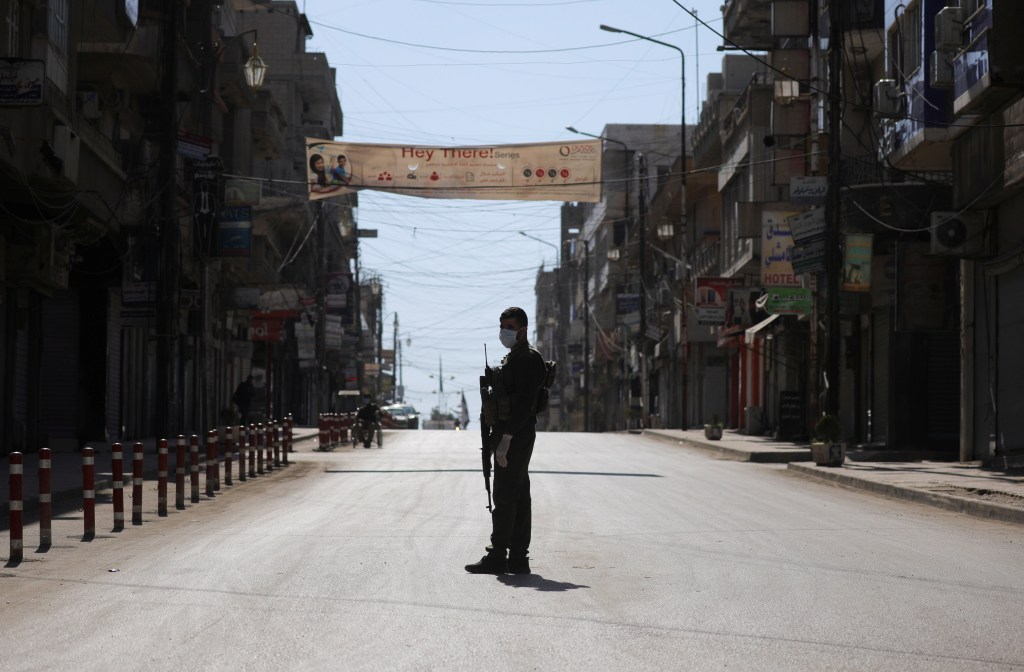Washington, D.C., February 9, 2022 – Northeast Syrian authorities must reverse their suspension of Rudaw Media Network’s broadcast license and the license of all their employees, stop attacks and harassment of its staff, and allow all journalists to work freely and safely, the Committee to Protect Journalists said Wednesday.
On February 2, Asayish security forces harassed and discouraged the crew from covering a public funeral of 12 members of the Kurdish-led Syrian Democratic Forces, who were killed in a fight to repel an ISIS assault on January 15, in the northeastern city of Qamishli, in the Rojava region, an autonomous region in northeastern Syria, according to a report by Rudaw.
After the funeral, one crew member was harassed by Asayish security forces, and two other crew members were abducted and beaten by an unknown group, according to the Rudaw report.
On February 5, the Autonomous Administration of North and East Syria—the regional government—announced that it was suspending Rudaw Media Network’s license to operate in northeastern Syria (Rojava), claiming the network spreads “hate and misinformation,” Rudaw reported. The administration also withdrew the licenses of all Rudaw employees, according to the report. Rudaw issued a statement on February 6 condemning the decision.
“Authorities in Northern Syria must halt their censorship efforts against the Rudaw network and investigate thoroughly assaults against its staff,” said CPJ Middle East and North Africa Program Coordinator Sherif Mansour. “Journalists should be allowed to cover the region independently without retribution, no matter how the Asayish forces feel about it.”
On the afternoon of February 2, a Rudaw crew consisting of reporter Viviyan Fatah, cameraman Issa Hassan, and driver Abdullah Majdal left to cover the funerals in a vehicle with the Rudaw logo, according to a journalist familiar with the case, who spoke to CPJ on the condition of anonymity, as they have not been authorized to speak publicly. Hassan, Fatah, and Majdal declined to speak to CPJ, as they have not been authorized by their outlet to do so.
At the funeral, an unidentified armed group, seemingly awaiting the crew’s arrival, began harassing them and discouraging their coverage, however the crew was able to finish their report, according to the journalist familiar with the case.
After the funeral, the cameraman and driver were collecting their equipment when five people, armed and wearing black military uniforms, approached the two and identified themselves as Asayish forces, according to Rudaw spokesperson Rebaz Ali, who spoke to CPJ by email. The group ordered the two journalists into their car and drove in front and behind the two, guiding them into a desert area in the city suburbs.
After they stopped, the group ordered Hassan and Majdal out of their car, blindfolded them, and proceeded to beat them with batons and threaten them if they continued working for Rudaw, according to the outlet’s report. After a half hour, the two men were released to their own car. CPJ was unable to confirm if the journalists reported the incident to police, received medical treatment, and what their injuries, if any, were.
The group also confiscated the crew’s camera, live stream equipment, and Fatah’s purse, which included several personal and media identification cards, according to the Rudaw’s report. As of Tuesday, February 8, none of the items had been returned to the journalists or their news outlet, according to Ali.
As Fatah was leaving the funeral, the journalist was approached by six female members of Qamishli’s local Asayish security forces who threatened to beat her if she continued working for Rudaw and accused her of working for “the enemies,” referencing the Turkish government, according to a person familiar with the case.
Also in attendance was Avin Yousif, co-chair of Free Media Union at the Autonomous Administration of North and East Syria, the Syrian Journalists’ syndicate, who witnessed the incident and told CPJ by phone that “it is unacceptable to treat journalists like that, as it is against all principles of the free media.”
Yousif joined Fatah after the security forces asked the journalist to go to the Asayish headquarters in the city, Yousif told CPJ. At the headquarters, authorities apologized and said they would work to prevent future similar situations.
“They (Asayish forces) abused and disrespected our staff,” Ali told CPJ, adding that the outlet condemns the attack and has asked Rojava authorities to “protect our staff and respect the freedom of the press.”
The crew has filed a lawsuit at Asayish headquarters, and they were promised that the attackers would be found and their items recovered, according to Rudaw’s report.
Asayish forces have not publicly taken responsibility for the act. CPJ called Badi Ahmed, spokesperson for the Asayish forces in the Rojava region, multiple times for comment but he did not answer.
CPJ called Ciwan Mulla Ibrahim, co-chair of information department in the Autonomous Administration of North and East Syria, for comment about the revoked licenses, but he declined to speak.
